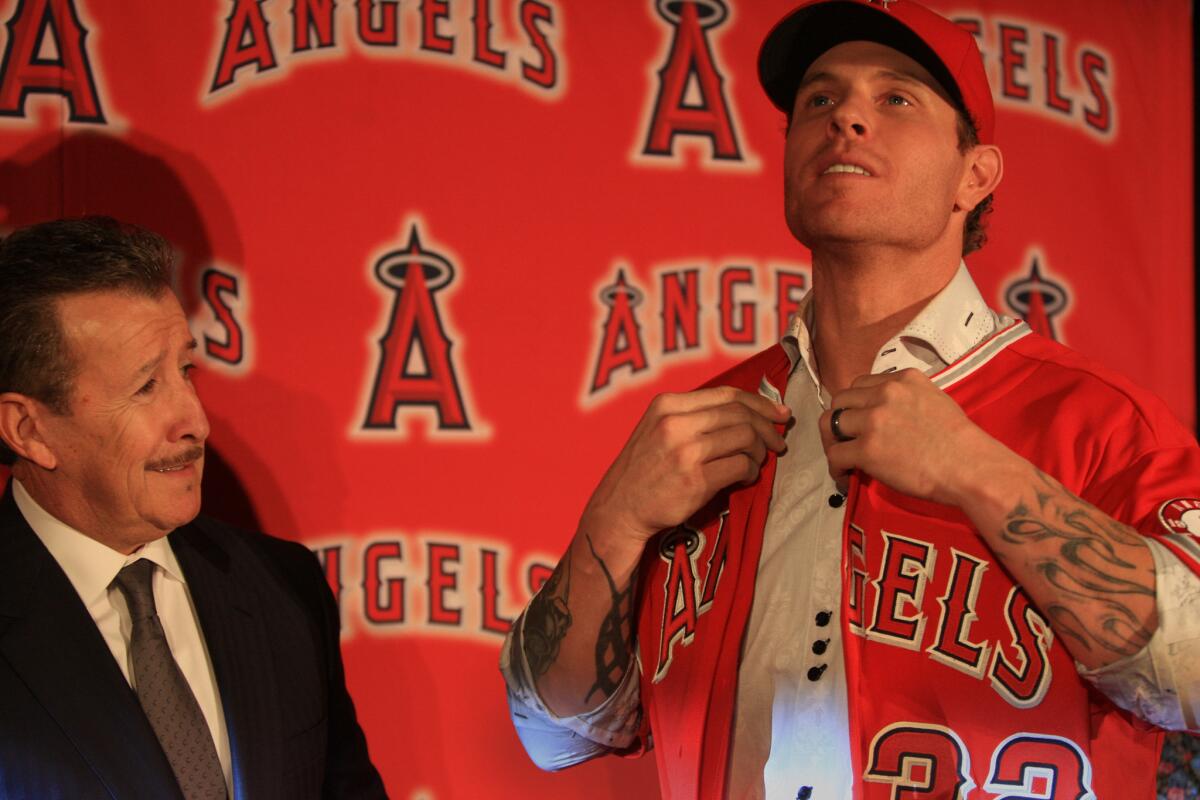Analysis:: Josh Hamilton case no Mickey Mouse affair for Angels’ Arte Moreno

Angels owner Arte Moreno, left, watches outfielder Josh Hamilton put on his jersey during a news conference to introduce the 2010 American League MVP on Dec. 15, 2012.
- Share via
Michael Eisner did not care for the rules. He would look out for his kingdom, in a way that would seem perfectly logical to Arte Moreno, and to a good many fans too. If a player on your team was involved with cocaine, how could the team be forbidden from taking disciplinary action?
In Baseball Land, the employees have a powerful union to protect their interests. And so, on Friday, the commissioner of baseball was reduced to issuing a statement that essentially said, “Yes, I would have suspended Josh Hamilton, but I had no authority to do so.”
In 1997, when the Walt Disney Co. owned the Angels and infielder Tony Phillips was arrested on suspicion of cocaine possession, Eisner treated him as he would have treated any other Disney employee. The Angels directed him to enter a treatment program and suspended him when he would not.
An arbitrator overturned that suspension. This time, with Moreno as the Angels’ owner, an arbitrator ruled Hamilton could not be suspended even though he admitted to using cocaine.
In each case, the overriding principle was this: The baseball owners had negotiated a collectively bargained agreement with the players, and the owners had to live up to it, like it or not.
In Hamilton’s case, perhaps the agreement suffers from “deficiencies,” as the commissioner’s statement put it. Perhaps not, since the union believes the drug policy worked as intended.
The sides can take that up in what is shaping up to be an increasingly rancorous round of bargaining next year. It was just four days ago that the union vowed that the Chicago Cubs’ decision to demote rookie slugger Kris Bryant would be “addressed in litigation, bargaining or both.”
But, make no mistake, Moreno is livid. He did not speak Friday morning, but the words of his lieutenants were loud and clear.
“It defies logic that Josh’s reported behavior is not a violation of his drug program,” Angels President John Carpino said.
“The Angels have serious concerns about Josh’s conduct, health and behavior,” General Manager Jerry Dipoto said. Left unsaid: If Hamilton did not have an injured shoulder, the Angels would have had to include him on their roster for Monday’s opener, with no leverage even to ask him to seek treatment. Also left unsaid: the Angels would have saved about $4 million for each month of a suspension.
Although Phillips was reinstated by an arbitrator for the final weeks of the 1997 season, the Angels let him go as a free agent after the season. Could these be the final months of Hamilton’s tenure with the Angels?
His first two years in Anaheim have been dreadful, a mix of injuries and ineffectiveness that frustrates his employers and some of his teammates. The Angels owe him $83 million through 2017.
In 2007, just after Moreno signed Gary Matthews Jr. for five years and $50 million, Matthews was reported to have received shipments of human growth hormone. Moreno was furious but powerless, and the two coexisted uneasily for three years, before the Angels dumped the underperforming outfielder on the New York Mets.
The Angels ended up paying Matthews all but $2 million. It is hard to believe Moreno would pay Hamilton even close to $83 million to go away, and maybe Hamilton comes back in May or June and starts hitting, finally.
But it is harder for Moreno to believe his hands should be tied. Eisner made his point by suspending Phillips, even as he was warned the suspension would not stand. It will be fascinating to see whether Moreno chooses to make an expensive point.
More to Read
Go beyond the scoreboard
Get the latest on L.A.'s teams in the daily Sports Report newsletter.
You may occasionally receive promotional content from the Los Angeles Times.











